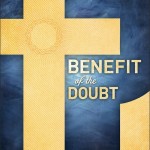We run our website the way we wished the whole internet worked: we provide high quality original content with no ads. We are funded solely by your direct support. Please consider supporting this project.
Court-of-Law Theology: How It Falls Short
Courtney “Coco” Mault via Compfight
Last week, we introduced a way of talking about theology with concentric circles. This approach is distinct from the common Western model of theology that depends upon a court-of-law framework. The following is an excerpt from Greg’s book Benefit of the Doubt regarding this:
____________________________
Within the legal strand of the Western theological tradition, God is viewed primarily as a judge, humans are thought of as guilty defendants, and Jesus is conceived of as a sort of defense attorney. Within this court-of-law framework, the atonement (that is, what Jesus accomplished on the cross) is construed as a sort of legal loophole that our defense lawyer worked out with the judge that somehow gets us off the hook by allowing the father to punish him instead of us. And our salvation, purchased by Jesus’ substitutionary death, is envisioned as an acquittal that allows us to avoid being sentenced by the Judge and consigned to prison (hell) forever.
“What’s wrong with that?” Some readers are undoubtedly wondering? “That’s the very view I was taught!” Well, it’s not entirely wrong. The New Testament does use some legal metaphors in describing God in a relationship with him. For example, God is depicted as a judge. Jesus is once referred to as our advocate before God (1 John 2:1). And the atonement is several times expressed in quasi-legal terms (e.g., Romans 3:25; Hebrews 9:15). At the same time, these legal metaphors are conceived of within a broader and more dominant covenantal context. …
You can see the pervasiveness of the court–of–law paradigm for theology in the sorts of questions Christians tend to ask. For example, I can’t tell you how many times people have asked me to specify exactly what they need to believe in order to be “saved.” Some have seriously wondered if a person who denies biblical inerrancy or who denies the earth was created in six literal days can be “saved.” A religious television personality recently suggested on his show that I was going to hell because I disagree with his interpretation of hell, and I’ve several times heard people suggest that I and anyone else who denied the “penal substitution” interpretation of the atonement were at least likely not saved. And, most disconcerting of all, as our country has become increasingly politically polarized over the last several decades, I’ve encountered more and more people who seriously question the salvation of sisters and brothers in Christ who espouse different political opinions! …
Other questions and concerns Christians commonly raise today reflect the same framework. If I had a quarter for every time I’ve been asked about “eternal security,” for example, I’d be a fairly wealthy man. Can a person lose their salvation? If so, what are the specific conditions for this qualification? What specific sins can cause one to become unsaved? …
The same holds true of the multitude of legal–type questions that I and other pastors regularly get about what exactly constitutes a particular sin. To no one’s surprise, at the top of the list are questions about what technically constitutes “fornication.” How far can a couple go before they’ve “crossed the line”? I’ve met a significant number of unmarried people who have convinced themselves that, so long as a couple stops short of vaginal penetration, they have not technically had “sex.” It took me quite a while to accept that certain unmarried couples were not joking when they would tell me some of the sexually intimate things they do while allegedly avoiding “sex”—some of which would make many married couples blush! But they are serious! This is what happens when people frame their relationship with God in terms of a legal contract. Reasoning like clever lawyers, they assume that if the acquittal-contract doesn’t explicitly close a loophole they’ve uncovered, they have the “right” to take it with impunity. (116-119)
Category: General
Tags: Benefit of the Doubt, Doubt, Faith, Theology
Related Reading

Rachel Held Evans Interviews Greg on Benefit of the Doubt
We shared an interview that Frank Viola did with Greg yesterday, and we’re thrilled to share an interview that Rachel Held Evans posted today. Rachel is very familiar with the resistance and criticism that comes when dearly held beliefs are challenged. We feel like she is a kindred spirit in this regard. We hope you’ll…

A Brief Theology of Faith
It is often argued that Hebrews 11:1 provides us with a clear definition of faith. The NIV translates it as, “Now faith is confidence in what we hope for and assurance about what we do not see.” Most of the times when we use different translations of the Bible, the differences between them are about…

Trusting God for the Wrong Things
Chloe was a smart, personable, and devoted Christian student from South America whom I had the pleasure of teaching in several theology classes. In one meeting, Chloe confessed that, despite the confident appearance that she projected, she actually lived with a sense of guilt and had never felt like a good Christian. In fact, Chloe…

Changing Beliefs
Stephen Mattson is a follower of ReKnew and a member of Woodland Hills Church who posted a piece on Sojourners titled Christians: It’s NOT a Sin to Change Your Beliefs. He points out that doubt and questions are a natural and needed part of any Christian’s life, and our community needs to change the ways we…

Video Q&A: Faith and the Historical Jesus
Greg is trying something new in order to answer more of your questions. He’s going to be taping himself addressing your questions with no polish of any kind: raw and unedited. You’ll notice in this first one that he’s pretty low in the frame of the camera, and we’ll be tweaking this as we go,…


